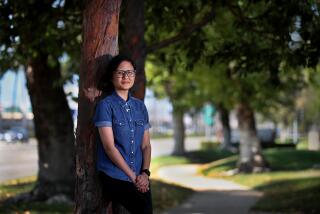Dr. Dean Ornish on the power of mindful choices
For more than three decades, Dr. Dean Ornish has been talking about the power individuals have to affect their health, even to the extent of reversing heart disease by changing the way they eat and behave. His prescription for sick people is radical, as he says, “a pound of cure.” But for the rest of us, it’s a what he calls a “spectrum program” of choices.
Ornish is talking about his ideas at the ninth annual Health Freedom Expo in Long Beach, March 1-3 (www.healthfreedomexpo.com).
You talk in your books about the value of love. What has love to do with a low-fat diet and keeping healthy?
What’s love got to do with it? Well, my program is much more than a low-fat diet. It includes a whole food, plant-based diet for people trying to reverse heart disease, moderate exercise, stress management techniques including yoga and meditation, and love and support.
Study after study has shown that people who are lonely and depressed and isolated — and I think that’s a real epidemic in our culture — are three times more likely to get sick and die prematurely than those who have a sense of love and connection and community. In part this is because when you are feeling lonely and depressed, you’re more likely to smoke, overeat, drink too much, work too hard, abuse yourself in different ways, as a way of just getting through the day.
We have support groups that are more intentional communities. We create a feeling of safety that enables people to let down their emotional defenses and talk openly and authentically about what’s going on in their lives with other people who are able to do the same. It’s very powerfully healing.
Are people living more healthfully than when you started out?
I think we’re seeing both ends of that spectrum. The forces of light and the forces of darkness are both growing stronger in every sense of the word. And so some people are even less interested in eating and living more healthfully. But many people are. I think that’s one of the reasons why heart disease rates have gone down so significantly in the last 15 or 20 years.
For reversing heart disease, that’s one thing, but the approach I take is a spectrum approach (www.ornish.com). It’s based on the idea that in all of our studies, we found the more you change, the more you can improve. In ways we can measure and in how you feel. At any age. … The more they change their diet and lifestyle, the better they get at any age. That’s a very hopeful, profoundly hopeful message we can give to people.
Why don’t you tell people what to eat or not eat?
I’ve found that if I tell somebody ‘Eat this and don’t do that,’ it’s not only not helpful, it’s counterproductive because even more than being healthy, we want to feel free and in control, and as soon as somebody tells us to do something, there’s a tendency to do just the opposite. The fact is that the first dietary intervention was ‘Don’t eat the apple,’ and that didn’t turn out very well, and that was God talking. So I can’t do better than that. What matters most is your overall way of eating and living.
Are doctors as a group more willing to take into account a broader spectrum of ideas?
When I began doing this work 36 years ago, there was a lot of criticism and disbelief. But since we’ve been able to prove, using these very high-tech, expensive, state-of-the-art, scientific measures, how powerful these very low-tech and low-cost and often ancient interventions are, that’s changing. It’s all happening at a time when the limitations of high-tech conventional medicine are becoming clear at the same time that the power of these ancient and low-tech interventions is becoming more documented. … The studies are showing that bypass surgery and angioplasties and stents don’t really prolong life or prevent heart attacks in people unless they’re in the midst of having one, which the vast majority of people are not who undergo those procedures — which we spent $100 billion on last year.
And Medicare is now covering my program. It’s the first time they’ve ever done anything like that.
You say that how you eat is as important as what you eat. Could you elaborate?
When you eat mindfully, by paying attention to what you eat, you get more pleasure with fewer calories. We’ve all had the experience of eating mindlessly, like watching a movie and eating a bag of popcorn. You look down and the popcorn is gone, and it’s like, ‘Who ate this?’ because you were not really paying attention, you were engrossed in the movie and not in what you were eating.
But if you are eating mindfully, then you can really enjoy what you are eating, much in the same way as you might savor a fine wine. I love chocolate, dark chocolate in particular. So I can savor the dark chocolate, and enjoy it and get an intense amount of pleasure in just a few calories.







